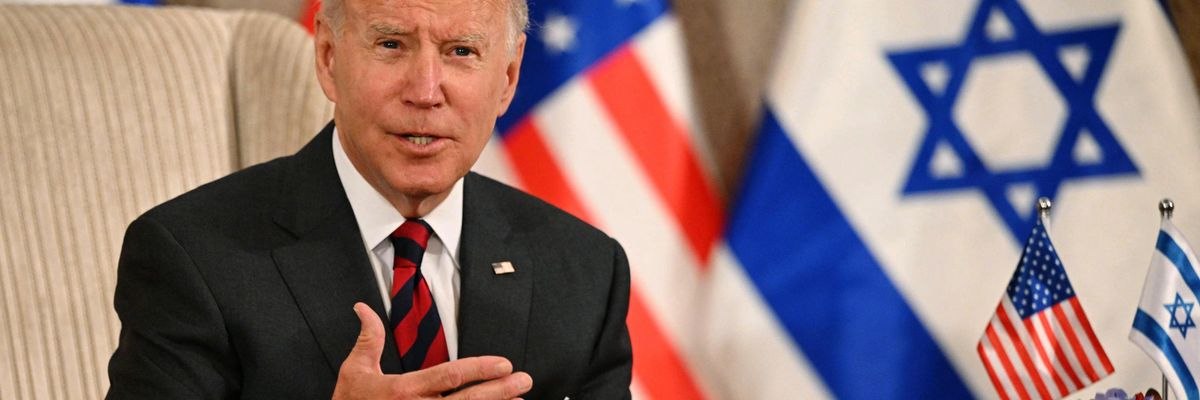In recent weeks, the Biden administration has attempted to pivot from its initial unconditional support for Israeli actions in Gaza by combining caution with a vague plan for “the day after.”
In the immediate aftermath of Hamas’ October 7 attack and murder of 1,200 Israelis, President Joe Biden offered the Netanyahu government exaggerated support including its right to defend itself, its goal of eliminating Hamas, and his pledge that the U.S. would always stand with Israel. This response to what had just occurred may have been understandable, but it soon became clear that Israel viewed Biden’s words as a green light to exact a punishing toll on the Palestinian people as a whole.
As the staggering numbers of dead grew, and Americans witnessed the horrific damage and scenes of over 1 million Palestinians walking miles seeking safety, the White House attempted a slight pivot. They cautioned Israel to be “more strategic” in bombing raids to not put civilians at risk. With no “and if you continue, we’ll...,” these warnings were viewed in Israel as toothless.
If we were serious about a path forward to the conflict’s peaceful resolution, we need to perform dramatic surgery to remove the cancer continuing to provoke violence and create radicalization on all sides. We would have to say “No” to the continued occupation.
As U.S. polls showed growing disapproval for Israeli actions and the administration’s timid response, coupled with signs of increasing Arab world dissatisfaction with America’s refusal to rein in Israel, the administration attempted to create even more distance. Key White House talking points now included: urging Israel to adhere to the “rules of war” by limiting civilian casualties, warnings that the U.S. wouldn’t accept the reoccupation of Gaza, and insistence on increased humanitarian assistance to displaced Palestinians.
Despite this slight change in tune, there was no shift in policy. The administration refused to place conditions on future U.S. military aid to Israel. Nor would it discourage Israel from resuming its war, while continuing to caution about “limiting” civilian casualties.
More recently, after the White House expressed concern with the lack of an Israeli “end game,” they offered a few of their own ideas—most of which are not “new” nor especially serious. In addition to warning Israel against a reoccupation of Gaza, they called for a “reconstituted Palestinian Authority” to administer Gaza, leading to recognition of the West Bank and Gaza as one entity that would constitute the future Palestinian state. The U.S. has also called on Israel to control settler violence in the West Bank.
After almost two months in which more than 15,000 Palestinians have been killed, 1.7 million forced to flee, and one-half of Gaza’s structures demolished, several questions come to mind. How will renewed bombings not take more civilian lives? With many of Hamas’ leaders and operatives having gone to the south, to a now overly congested region of misery, how can Israel fulfill its goal of eliminating Hamas without creating more deaths? How can the Palestinian Authority be reconstituted while Palestinians continue to live under occupation?
While Hamas’ popularity was low before the war began, polls now show that Hamas is surging in support, with the PA losing even more legitimacy. How can an election be held under these conditions, which is almost guaranteed to produce a result that the Israelis and the U.S. will never accept?
Although many ideas put forward by those close to the White House also envision an end of the Netanyahu government and its replacement by a new coalition, no possible reconfiguration of the existing Knesset nor a new election will produce a government able to pursue significantly different policies regarding Palestinians. They would not guarantee anything close to an independent Palestinian state, would be unable to rein in settlers and uninterested in limiting settlement expansion in the West Bank.
Just two words would reverse this downward spiral. The first is “No.” Instead of oblique reminders of the “rules of war,” or asking the Israelis to please limit civilian casualties, settlement expansion, or settler violence, the president should just say “No.” No more offensive military equipment or U.S. support in international fora without a permanent cease-fire, firm action to disarm violent settlers, and an end to all settlement expansion.
If we were serious about a path forward to the conflict’s peaceful resolution, we need to perform dramatic surgery to remove the cancer continuing to provoke violence and create radicalization on all sides. We would have to say “No” to the continued occupation.
To facilitate this, the U.S. would have to change its “No” at the United Nations to a “Yes” and support a Security Council resolution recognizing Palestine as a state, declaring its continued occupation as a threat to regional peace and security, and ordering an empowered U.N. peacekeeping force to the occupied territories to provide peace and security for both Israelis and Palestinians.
Such moves from the U.S. would undoubtedly cause a shock to both societies. Only under the security provided by such a U.N. mandate would the Palestinians be able to put their house in order. At the same time, the shock of a U.S. “No” to Israel and “Yes” to a U.N. Security Council resolution that would change the status of territories to Palestinian land, Israelis would be left to ask hard questions about where decades of unchecked acquisitiveness and expansion have led them. They would be forced to reexamine whether they could continue to oppress Palestinians with impunity. In the aftershock, sane voices will be able to break through in the public square reigniting both Israeli peace forces and Palestinian moderates. It won’t be easy, but leaving the cancer in place is nothing more than a prescription for certain death. A shock to the system is required and it all begins with a U.S. “No” followed by “Yes.”
